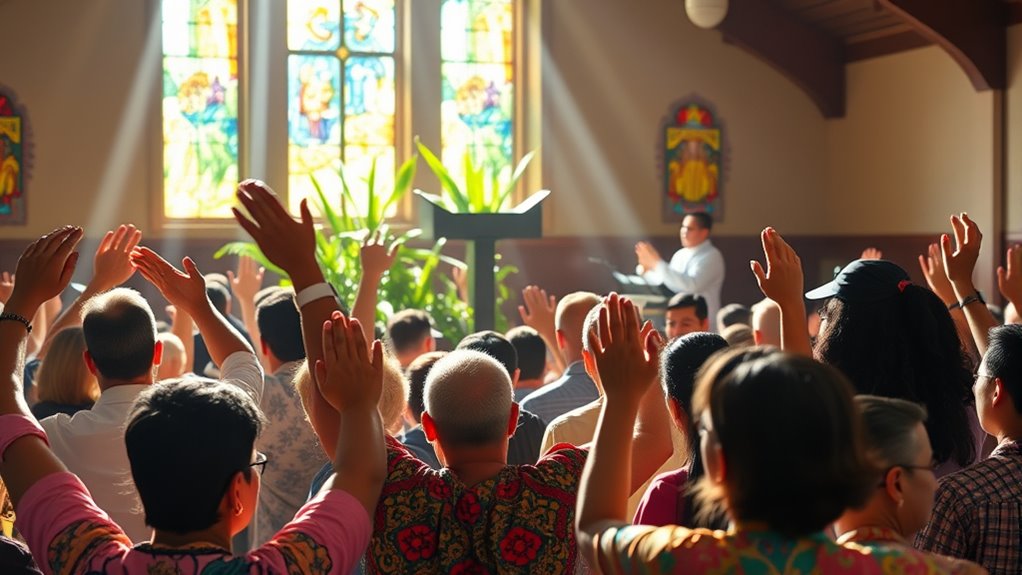The rise of Hispanic evangelicals in the U.S. is reshaping the religious landscape through rapid population growth, vibrant communities, and active engagement in social and political issues. As these communities grow, they’re forming diverse churches that blend cultural traditions with faith, using both Spanish and English. They’re also becoming more involved in advocating for social justice and shaping community networks. If you continue exploring, you’ll discover how these changes are influencing broader societal dynamics.
Key Takeaways
- Hispanic evangelicals are experiencing rapid population growth and increasing influence in U.S. religious and social landscapes.
- Demographic shifts, urbanization, and cultural traditions shape their community dynamics and faith practices.
- Bilingual worship and cultural celebrations foster stronger community bonds and spiritual identity.
- Churches serve as vital hubs for social engagement, community support, and activism on social issues.
- Technological adoption and diverse theological perspectives are shaping the future expansion of Hispanic evangelical communities.
Demographic Shifts and Population Growth
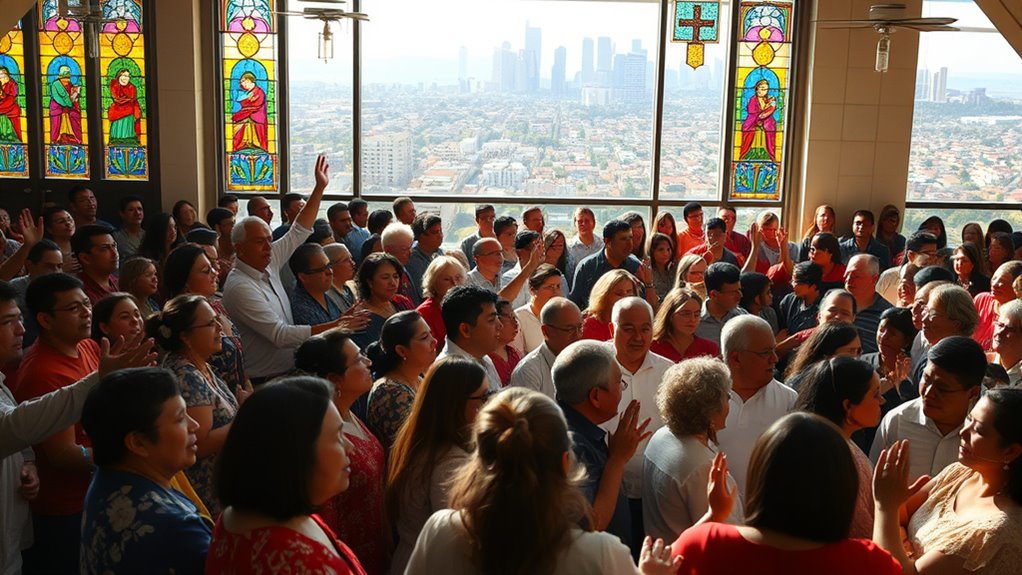
Hispanic evangelicals in the U.S. are experiencing significant demographic shifts driven by rapid population growth. As more Hispanic communities expand, urbanization impacts become evident, with many settling in cities that offer new opportunities. This growth fuels changes in community dynamics, shaping where and how these groups practice their faith. Economic mobility plays a vital role, as increased access to urban jobs allows many to improve their financial situations. You may notice that these demographic shifts lead to larger congregations and more diverse church communities. This growth isn’t just about numbers; it’s transforming the social landscape and influencing how Hispanic evangelicals connect with their faith and their neighbors in rapidly changing urban environments. Proper planning and understanding of retirement planning concepts can help individuals in these communities secure their futures amidst these rapid changes.
Cultural and Religious Identity Formation
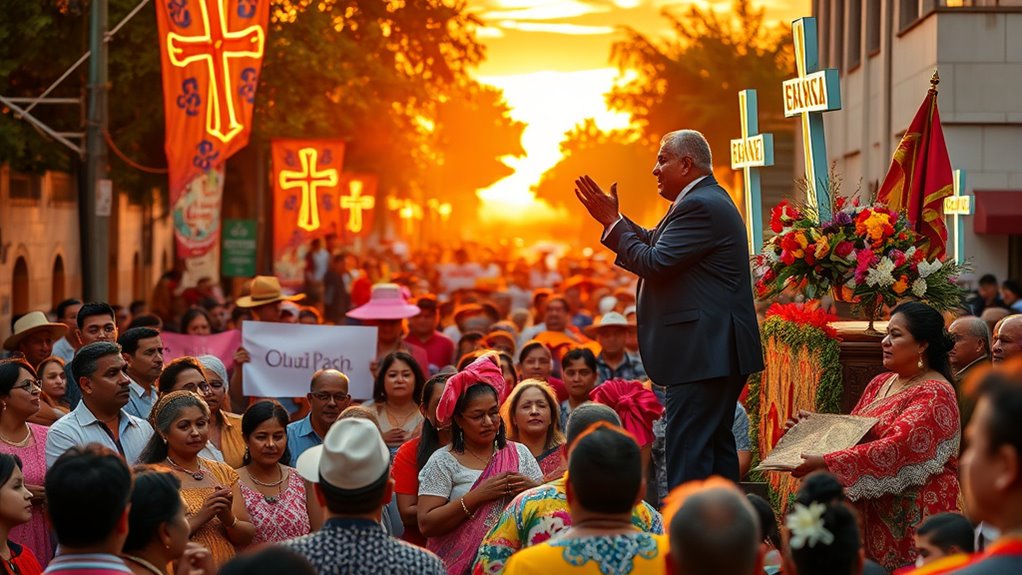
Your cultural traditions and faith shape how you experience and express your beliefs, blending heritage with spirituality. Language plays a key role, influencing how religious practices are shared and understood across generations. As younger generations grow, shifts in faith and cultural identity challenge you to find new ways to stay connected to your roots. Recognizing soulmate angel numbers can deepen your understanding of love and relationships within your cultural context.
Cultural Traditions and Faith
How do cultural traditions shape faith among Hispanic evangelicals in the U.S.? Your music traditions play a crucial role, blending lively rhythms and spiritual songs that reinforce community and worship. These musical styles connect you to your roots while expressing faith passionately. Food customs also influence your spiritual life, as shared meals after church services foster fellowship and reinforce cultural bonds. Celebrating religious holidays with traditional foods and music creates a sense of belonging and spiritual unity. These cultural elements serve as a bridge between your faith and heritage, making worship more meaningful. By integrating music traditions and food customs into your faith practice, you strengthen your identity and deepen your spiritual experience within the Hispanic evangelical community.
Language and Religious Expression
Embracing both Spanish and English, language becomes an essential tool for expressing faith and strengthening cultural identity among Hispanic evangelicals in the U.S. Bilingual worship allows you to connect deeply with your roots while engaging with a broader congregation. The linguistic diversity within your community fosters inclusivity and reflects individual backgrounds. You may find churches that incorporate both languages seamlessly, creating a welcoming space for all. This approach helps preserve cultural traditions while adapting to new environments. Your faith journey becomes richer as you navigate between languages, reinforcing your identity. Recognizing Dog names as a way to honor personal or cultural connections can also play a role in community bonding and individual expression.
Intergenerational Faith Shifts
Language and cultural expression play an essential role in shaping intergenerational faith within Hispanic evangelical communities. As younger generations grow up in a bilingual or primarily English-speaking environment, they may experience shifts in intergenerational values related to faith transmission. You might notice that older family members emphasize traditional practices and Spanish-language worship, while younger members seek a more individualized or modern expression of faith. These differences can challenge the continuity of faith transmission but also create opportunities for new forms of spiritual engagement. Steering through this dynamic requires balancing respect for cultural heritage with adapting to changing cultural contexts. Additionally, utilizing popular apps for community support and faith tracking can facilitate ongoing engagement across generations. Ultimately, understanding these intergenerational faith shifts helps you appreciate how faith evolves across generations while maintaining core spiritual values.
The Role of Churches and Community Networks
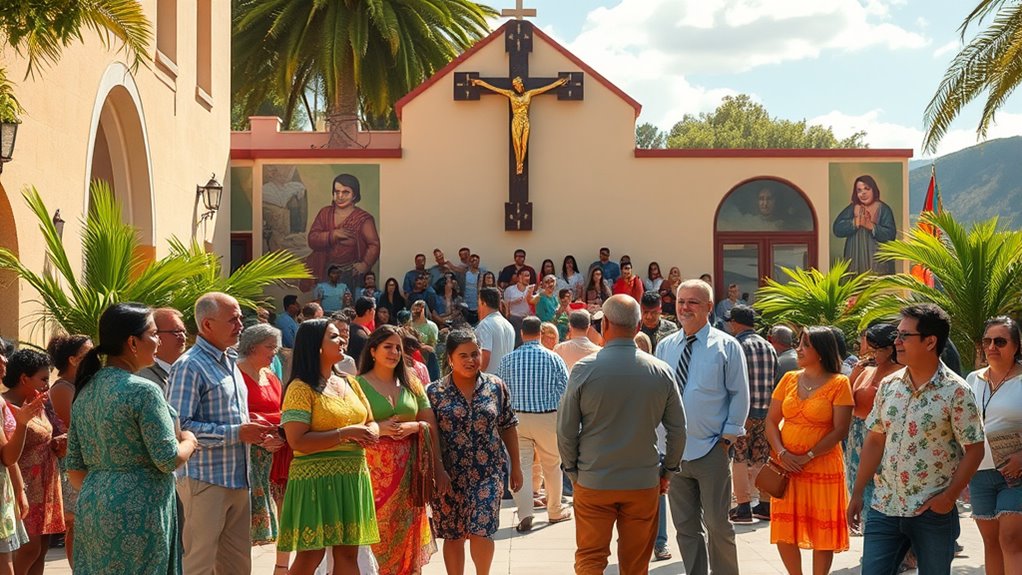
Churches and community networks play an essential role in shaping the social and spiritual lives of Hispanic evangelicals in the U.S. They serve as hubs for church outreach, offering support and fostering connections. Through active community leadership, these networks address local needs, promote cultural values, and strengthen faith. Your involvement can lead to meaningful relationships and a sense of belonging. These networks also facilitate spiritual growth beyond Sunday services, creating opportunities for mentorship and service projects. They help newcomers integrate into American society while maintaining cultural roots. By participating in church outreach and community leadership, you contribute to building resilient, faith-based communities that empower individuals and promote social cohesion.
Churches and community networks foster faith, cultural roots, and social support for Hispanic evangelicals in the U.S.
- Church outreach programs
- Community leadership initiatives
- Cultural celebrations
- Social service projects
- Faith-based mentorship
Political Engagement and Social Influence

Hispanic evangelicals in the U.S. are increasingly active in shaping political and social discussions, recognizing their collective influence as an essential force within their communities. Through faith activism, they mobilize around issues like immigration, education, and social justice, aligning their religious values with civic participation. Many participate in voter registration drives, town halls, and community organizing, emphasizing the importance of their voices in shaping policies. Their engagement extends beyond individual actions, fostering a sense of shared responsibility to impact societal change. This growing activism reflects a commitment to both faith and civic duty, empowering Hispanic evangelicals to influence political discourse and advocate for priorities aligned with their values. Their social influence continues to grow, shaping the future of community leadership and policy.
Challenges and Opportunities Ahead
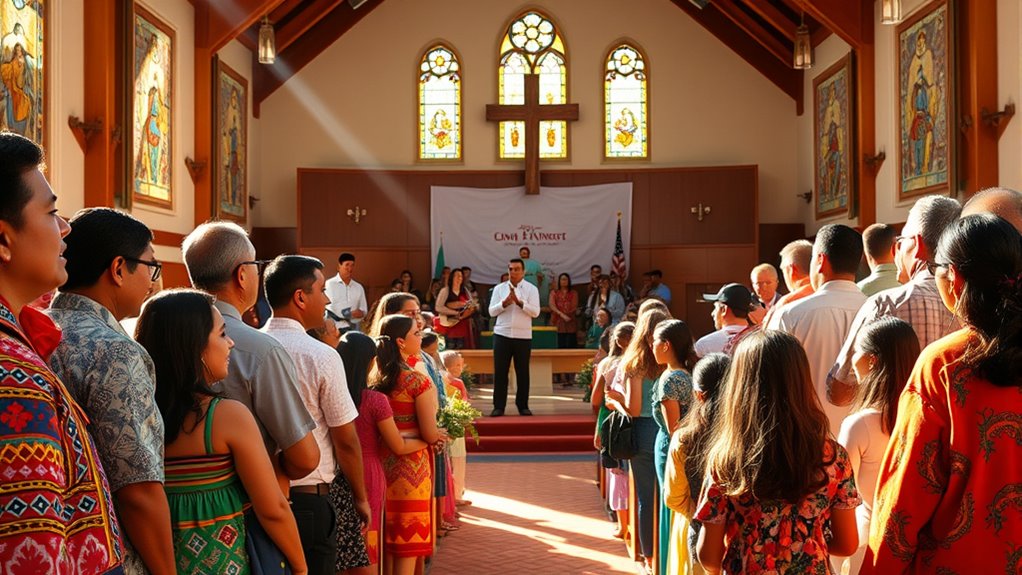
As Hispanic evangelicals continue to grow more active in political and social arenas, they face both significant challenges and promising opportunities. Engaging in interfaith dialogue can foster understanding but also requires maneuvering sensitive cultural differences. Economic challenges may hinder community development and access to resources, creating barriers to growth. Opportunities include building bridges with diverse faith communities and advocating for social justice. You can leverage your influence to promote unity and inclusion, fostering stronger civic engagement. Embracing interfaith dialogue can help address cultural sensitivities and build trust among different communities.
Future Trends and Implications
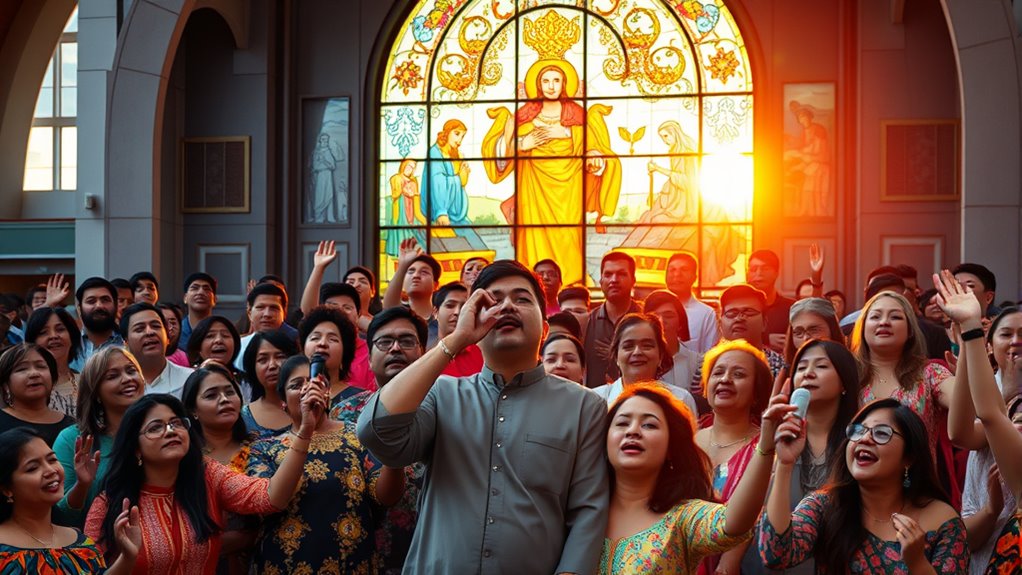
Looking ahead, the future of Hispanic evangelicals in the U.S. will be shaped by their ability to adapt to shifting social, political, and cultural landscapes. Digital evangelism will play an essential role, allowing you to reach a broader and more diverse audience through social media, online services, and podcasts. Embracing technological tools will enable you to stay connected and share your faith in innovative ways. Additionally, theological diversity will continue to grow within Hispanic communities, fostering a more inclusive environment for different interpretations and practices. This diversity can strengthen community ties and encourage dialogue, but it also challenges traditional boundaries. Your ability to navigate these trends with openness and adaptability will greatly influence the future trajectory of Hispanic evangelicalism in the U.S. The use of resources like faith-based tools will become increasingly important in supporting community growth and engagement.
Frequently Asked Questions
How Do Hispanic Evangelical Practices Differ From Other Christian Denominations?
You’ll notice that Hispanic evangelical practices differ through vibrant cultural expressions and lively worship styles. You might experience energetic singing, dancing, and expressive prayer, reflecting their rich cultural heritage. Compared to other Christian denominations, their services often emphasize community, music, and emotional engagement. These practices help create a warm, inclusive atmosphere, blending faith with cultural identity, making their worship uniquely vibrant and spirited.
What Role Does Language Play in Hispanic Evangelical Worship Services?
Language plays a vital role in Hispanic evangelical worship services, shaping your spiritual experience. Bilingual worship keeps you connected, blending Spanish and English to foster inclusivity and cultural preservation. As you participate, you might notice how switching languages deepens your understanding and strengthens community bonds. This deliberate use of language preserves heritage while embracing modern faith expressions, making worship more meaningful and accessible for everyone involved.
How Are Hispanic Evangelicals Influencing American Religious Landscapes?
Hispanic evangelicals are reshaping American religious landscapes through cultural integration and community outreach. You see them blending traditional Hispanic customs with mainstream practices, making worship more inclusive. Their active outreach efforts foster stronger community bonds and attract diverse populations. By emphasizing cultural identity and compassionate service, you notice a growing influence that diversifies and enriches the broader religious scene in the U.S., shaping its future direction.
What Are the Main Concerns of Young Hispanic Evangelicals Today?
Imagine a tightrope walker balancing between tradition and change—that’s you. As a young Hispanic evangelical, your main concerns center on forging a strong generational identity while staying true to faith. Social justice issues, like immigration and inequality, weigh heavily on your mind, urging you to act with compassion and purpose. You seek to reconcile cultural roots with modern challenges, endeavoring for a faith that empowers and uplifts your community.
How Do Hispanic Evangelicals Navigate Their Cultural Heritage and Faith?
You navigate your cultural heritage and faith through a balance of cultural identity and faith integration. You celebrate traditions while embracing Christian beliefs, blending cultural practices with your spiritual life. This process helps you stay connected to your roots, making your faith more meaningful and personal. By honoring your heritage, you strengthen your spiritual journey, creating a unique faith expression that respects both your cultural background and religious convictions.
Conclusion
As you watch this vibrant wave grow, it’s like a sunrise casting new light across the nation’s landscape. These Hispanic evangelicals are shaping a future where faith and identity intertwine, forging connections that ripple through communities and beyond. With every prayer and gathering, you see a movement rising—full of hope, challenge, and promise. Embrace this unfolding story, where every step forward paints a brighter horizon on the canvas of America’s spiritual landscape.

